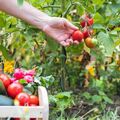Tips And Tricks That Every Organic Gardener Should Know
What are your personal thoughts on organic gardening? Do you view everything you can on the subject, and try to improve upon your own garden? There are numerous resources available such as magazines, videos, books, shows, etc. So where do you begin with your own techniques? Try going through these tips to find your starting point.
Protect your seeds from fungus with natural products. You can use milled sphagnum moss to protect all your plants. If your seeds need light to grow, sprinkle the moss first and then place your seeds. This solution is much better than any chemicals you can find in a store and will protect your seeds efficiently.
As soon as your seeds start sprouting make sure they have enough light. Move your plants next to a sunny window or put them inside a greenhouse. If you cannot do this, use fluorescent lights. Remember that your plants need up to sixteen hours of light every day.
A great tip when beginning an organic gardening is to add lime to your seed-starter mix. This is done to reduce the acidity of your peat. Too much acidity can damage it. You should aim to add around 1/4 teaspoon of lime in every single gallon of your seed-starter mix.
Plant ornamental, edible plants as part of your regular yard landscaping. Good plants to start with include rosemary, thyme varieties, sages, oregano and basil. These all look great mixed with perennials, and they will supply you with enough that you won't need to purchase them anymore - herbs are expensive at the supermarket.
When first growing a garden, attempt to put as much effort into the first bed as possible. Land that hasn't been used for a while needs an overhaul to begin changing into a viable spot for plants. Usually these regions either lack the right nutrients or consistency of soil. If you plan to make a garden out of patch, make sure that it has all the right pre-conditions to planting.
If you are beginning an organic garden, you should make sure that you re-pot your seedlings into larger containers with a compost mix as soon as your seedlings begin crowding each other in their original containers. If you do not do this, your seeds will eventually suffocate themselves and die.
An important tip for organic gardening that will naturally help prevent disease from appearing in your plants is to move your plants to different spots of your garden each year. This will keep any disease from spreading because the soil doesn't build up harmful organisms from planting in the same spot each year.
Organic gardening means trying to grow plants as naturally as possible without the use of chemicals. So when the time comes to kill harmful, plant-eating insects, try planting a few flowers in your vegetable garden. The flowers will attract beneficial insects that naturally kill the harmful ones. These beneficial insects perform other valuable services like pollination as well as pest control.
Now that you have an idea on where to start crafting your own organic gardening techniques are you ready to start experimenting? Are you ready to apply what you read to your garden? Can you help your garden grow properly? If you can, then have fun! If not, make sure to review the tips again.
1. https://bit.ly/2SWCqdd
2. https://bit.ly/3vWqRzO
3. https://bit.ly/3wXn2vQ
4. https://bit.ly/2U0sEXF
5. https://bit.ly/3dfHYpQ





